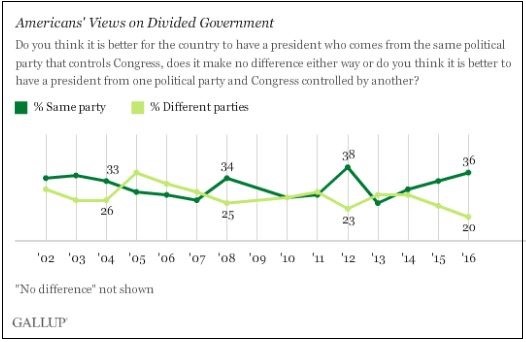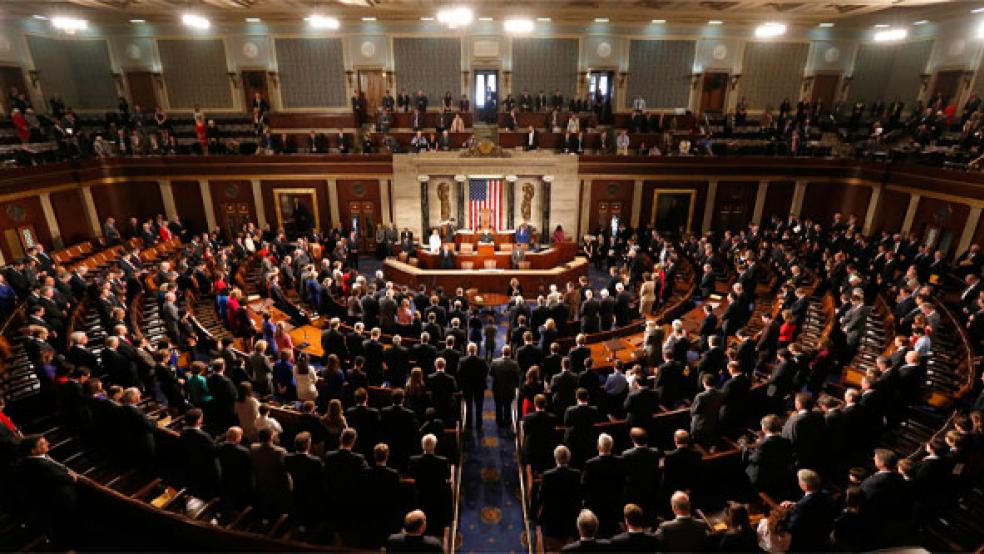Voters face a series of tough decisions in less than six weeks. Not only do they have to choose a new president, but they also have to elect people to fill all 435 seats in the House of Representatives, and choose 34 Senators as well. Besides the relative merits and demerits of the individual candidates on all these levels, voters must decide whether to support the Republican or Democratic agenda based on the majorities in Congress and the winner of the presidential election.
That adds one more important question for voters. Should those all come from the same political party? Do Americans want divided government that would require a broad consensus for action, or do they want to issue a mandate for change that bypasses the opportunity for obstruction?
Related: Why Hillary Clinton May Have a Problem With Independent Voters
Gallup offers a surprising answer. In a survey taken the same week as the presidential debates, support for divided government hit its lowest point in the fifteen years that Gallup has polled on the question. Only one in five believe splitting power between the two parties is necessary, while those who want one-party government just barely missed hitting a new high at 36 percent.
Some of this change is self-serving, at least when looking at the data from a partisan perspective. Republicans took firm control of the House in 2010, a situation that looks unlikely to change until at least the next census and reapportionment in 2020. Despite having a disadvantage in Senate races, it now looks as though the GOP has a relatively realistic chance of holding its Senate majority; Nate Silver’s FiveThirtyEight puts the odds at 43.9 percent.
All Republicans need for one-party government is a Donald Trump victory, so it’s not much of a surprise to see support for single-party governance go up from 36 percent in 2012 to 42 percent now. Conversely, with Democrats having no chance to win control of the House and seeing the odds slip on winning the Senate, the nine-point drop in support for one-party governance to 40 percent in the past four years is very understandable. In both cases, as one would imagine for partisans, support for one-party control still outstrips that for divided government no matter what the circumstance.

The mood among independents seems a little more counterintuitive. The plurality of independents has long believed that it makes no difference, but for the first time, same-party support has edged out divided government, albeit by only a single point. That, along with a sharp drop in support for divided government among Democrats has driven Gallup’s topline findings.
Related: Hillary Has Lock on the Black Vote, but May Have Alienated White Voters
What has caused this shift, which itself cuts against the grain of American political culture? The founders set up American constitutional government two hundred and thirty-seven years ago using the principle of coequal branches to check the power of each. The two-party system developed later as a method of balancing competing coalitions on the basis of ideology and geography, and Americans adapted the concept of checks and balances in electoral politics as well.
History shows voters tend to favor divided government as well. Since the election of Richard Nixon, only six of 24 Congressional sessions have been part of single-party governance, four of which were controlled by Democrats. Divided government has been the norm, not the exception.
That norm could well be the problem, because voters don’t see the result as a “norm” at all. Polls show increasing numbers of Americans saying that the country is going in the wrong direction, and frustration with Congress growing. Theoretically, divided government should produce compromise on basic issues such as budgets and regulation. Instead, voters have seen deadlock and shutdowns that produce no progress at all for either side.
Barack Obama picked up on that frustration and responded to it by going all-out on executive actions in his final two years, daring Congress and the courts to stop him. So far, despite some setbacks in federal court, Obama’s approval numbers have risen to their highest levels in years. Congress’ approval levels have barely budged from the basement.
Related: Here’s Who the Betting Markets Are Saying Will Win the Election
That certainly could explain the results of the presidential primaries, too. Republicans had more than a dozen well-qualified officeholders running for the nomination, but primary voters chose an outsider who ran on the premise that he could cut the best deals to get Washington working again for hard-working Americans. Democrats nearly handed the nomination to a socialist ideologue, but ended up choosing the woman who argued that she was best positioned to deal with Republicans to do the same.
However, single-party governance has proven politically unsustainable -- and for a clear reason. Parties that achieve that control have used it for their own ends, rather than those of their constituents. The most recent four-year period of GOP total control ended in lobbyist-related scandals and conservative anger over bloated budgets.
The most recent two-year period of Democratic total control resulted in almost nothing except the passage of a bloated and pork-ridden stimulus bill, and the even-then-unpopular Obamacare system. The latter may have been a short-term victory, but it turned into such a long-term albatross that it may well prevent them from winning what should be an easy victory for Senate control in November. It’s certainly what cost them Senate control in 2014.
Political parties. You can’t live with them alone, and they can’t live with each other either. In other words, nothing boosts the desire for divided government than single-party control, and vice versa, as we see now.
Related: The Most Important Point Clinton Made in Her Debate Against Trump
That distaste for infighting and business as usual may well have consequences for the upcoming election. Are there enough moving toward a desire for single-party governance to make an impact on their presidential choice, which is where those choices will have the most impact? If so, will this provide momentum for Trump, given the GOP control on the House and likely the Senate? After all, if voters have tired of the status quo in politics, Hillary Clinton represents that far more than does Trump.
Either way, voters have made it clear that they want more than just political trench warfare. The first party who can figure out how to break out of that paradigm and produce results rather than scandal might keep the upper hand in American politics well past the next session of Congress.






